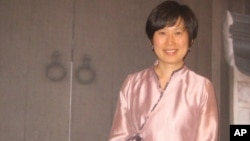SEOUL - South Korea honors Friday women who are raising children on their own. Advocates say single, unwed mothers face discrimination and are often pressured to give up their children for adoption. Formerly adopted Koreans are now some of the strongest supporters for these single moms.
Advocacy for single mothers
The second annual Single Mother’s Day ceremony was held at the National Assembly Complex in Seoul. Supporters of unmarried mothers not only want to press the government for more assistance, but also end discrimination against women who give birth out of wedlock.
Choi Hyung-sook runs an advocacy group and shelter for unmarried moms, like herself. The 40-year old says it is not unusual for South Korean families to abandon their daughters, if they become pregnant before marriage.
Choi says there is a big difference between being a single mom in Korea and some other countries. She says even the word for single mother in Korean comes with a negative connotation and causes prejudice, so they prefer to just use the English term. These women are shunned from society.
There are no official statistics on how many South Korean women become single mothers each year.
Choi says pregnant, unmarried ladies are often pressured by their families to have an abortion or give their child up for adoption once it is born.
South Korea has a long history of overseas adoption. Since the 1950s, around 150,000 Korean babies have been adopted by mostly Western families. Often these children were born to single mothers.
Over the past decade, some of these adoptees, now adults, have returned to the land of their birth and are now advocates for single mothers.
Adult adoptees raise awareness
Jane Jeong Trenka was adopted in 1972 and heads TRACK, Truth and Reconciliation for the Adoption Community of Korea, an organization that opposes overseas adoption.
She says because of Korea’s patriarchal culture, resources that could help single women are instead spent on promoting adoption.
“Because Korea is so prejudiced against the women who are having children out of wedlock, instead they are prioritizing their money in a way that favors orphanages over being cared for by your own mom," Trenka stated.
Trenka says if given the choice, most women would want to keep their babies. But due to the financial hardship and lack of support from families, too many single mothers continue to put their children up for adoption.
Advocacy for single mothers
The second annual Single Mother’s Day ceremony was held at the National Assembly Complex in Seoul. Supporters of unmarried mothers not only want to press the government for more assistance, but also end discrimination against women who give birth out of wedlock.
Choi Hyung-sook runs an advocacy group and shelter for unmarried moms, like herself. The 40-year old says it is not unusual for South Korean families to abandon their daughters, if they become pregnant before marriage.
Choi says there is a big difference between being a single mom in Korea and some other countries. She says even the word for single mother in Korean comes with a negative connotation and causes prejudice, so they prefer to just use the English term. These women are shunned from society.
There are no official statistics on how many South Korean women become single mothers each year.
Choi says pregnant, unmarried ladies are often pressured by their families to have an abortion or give their child up for adoption once it is born.
South Korea has a long history of overseas adoption. Since the 1950s, around 150,000 Korean babies have been adopted by mostly Western families. Often these children were born to single mothers.
Over the past decade, some of these adoptees, now adults, have returned to the land of their birth and are now advocates for single mothers.
Adult adoptees raise awareness
Jane Jeong Trenka was adopted in 1972 and heads TRACK, Truth and Reconciliation for the Adoption Community of Korea, an organization that opposes overseas adoption.
She says because of Korea’s patriarchal culture, resources that could help single women are instead spent on promoting adoption.
“Because Korea is so prejudiced against the women who are having children out of wedlock, instead they are prioritizing their money in a way that favors orphanages over being cared for by your own mom," Trenka stated.
Trenka says if given the choice, most women would want to keep their babies. But due to the financial hardship and lack of support from families, too many single mothers continue to put their children up for adoption.






